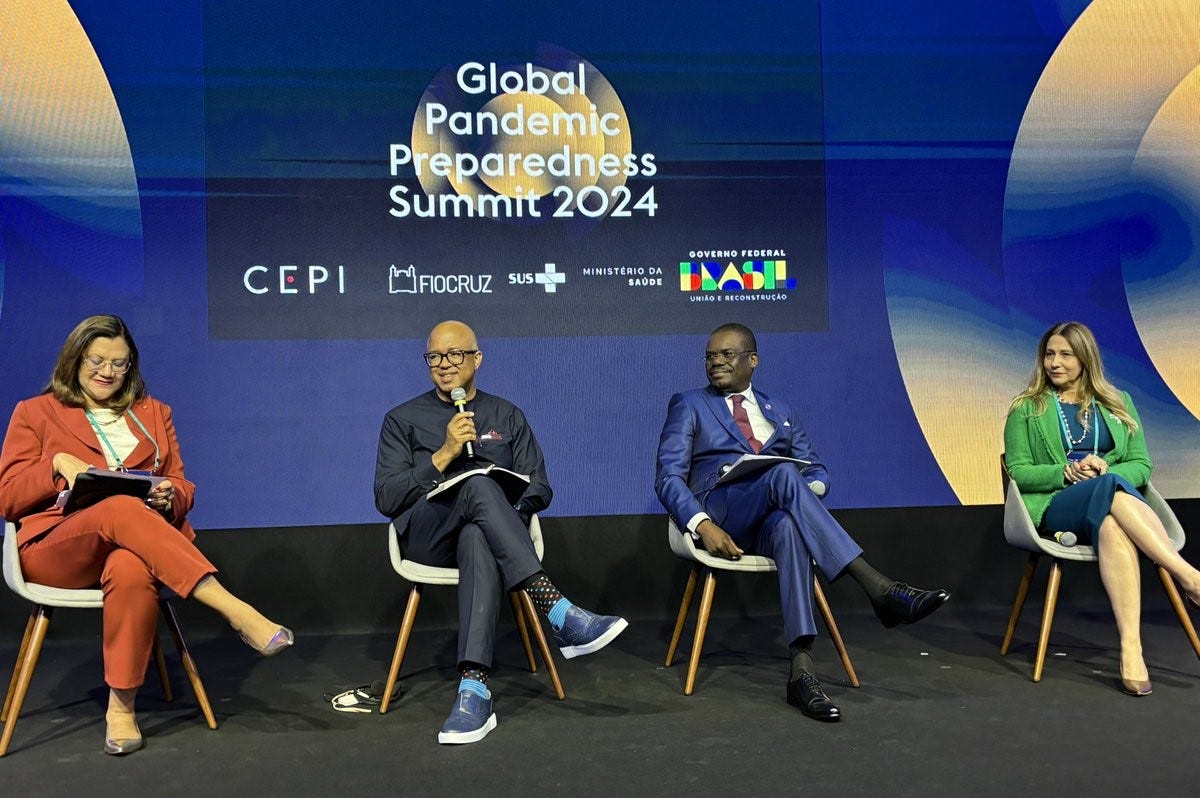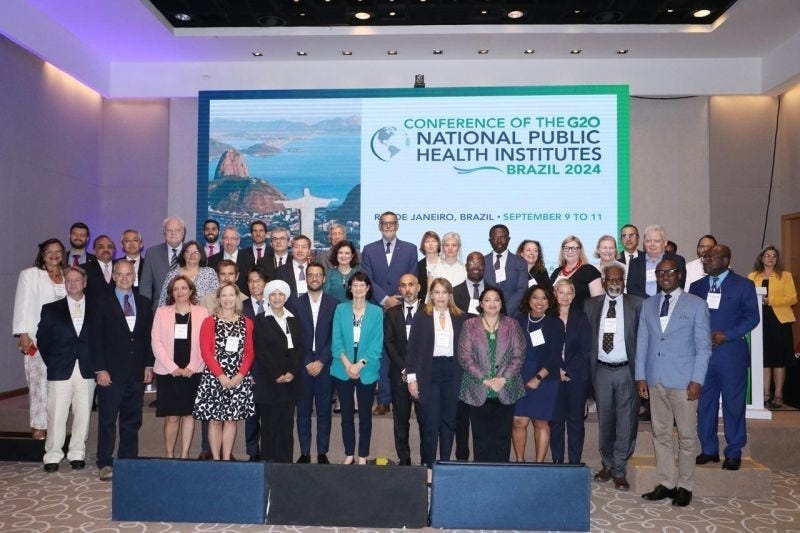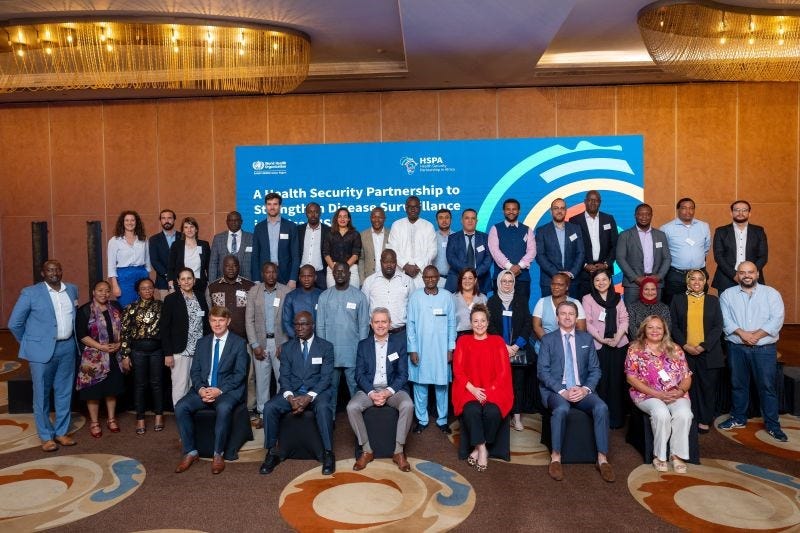In the third quarter of 2024, the WHO Hub for Pandemic and Epidemic Intelligence (WHO Hub) and our dedicated partners reached new heights, achieving critical milestones and advancing the global implementation of Collaborative Surveillance.
In this issue, dive into highlights from the World Health Summit in Berlin, the Global Pandemic Preparedness Summit in Rio de Janeiro, and how our partnerships are moving forward the reshaping of pandemic preparedness.
The WHO Hub joined the World Health Summit for crucial discussions on building trust in emergency preparedness
This October, the World Health Summit in Berlin gathered global leaders from politics, academia, the private sector, and civil society to explore bold solutions for a healthier future. Under the summit theme "Building Trust for a Healthier World," the WHO Hub for Pandemic and Epidemic Intelligence hosted two sessions that focused on building trust before and during health emergencies.
Building Trust for Better Decision-Making in Health Emergencies from a Regional Perspective
On October 13, the Hub hosted a plenary discussion on the essential role of trust in global emergency preparedness and response, examining the intricate dynamics required to build and sustain it. The session underscored the vital contribution of regional health organizations in fostering collaboration and trust among nations, particularly during crises. It also highlighted the importance of institutional support for mobilizing resources and unifying strategies. Overall, the discussion framed trust as the cornerstone of resilient health systems and effective emergency response worldwide.
Highlights:
Dr. Mike Ryan, Executive Director of WHO’s Health Emergencies Programme, emphasized that while discussions often focus on building people’s trust in governments and institutions, it is equally critical to trust the knowledge and resilience of the communities we serve, especially young people.
Germany’s Federal Minister of Health, Prof. Dr. Karl Lauterbach, highlighted Germany’s ongoing commitment to build trust across all levels to be better prepared for future health crises and stressed that science must be the basis for all policymaking.
Dr Braka Fiona from WHO’s Regional Office for Africa moderated an insightful discussion with diverse regional perspectives from Dr Hanan Balkhy, WHO Regional Director for the Eastern Mediterranean, Dr Lisa Indar, acting Executive Director of the Caribbean Public Health Agency, Dr Jean Kaseya, Director-General of Africa CDC, Dr Hans Kluge, WHO Regional Director for Europe and Dr Pamela Rendi-Wagner, Director of the European Centre for Disease Prevention and Control.
Dr Matshidiso Moeti, WHO’s Regional Director for Africa, closed the session by calling on all participants to remember that trust is earned, not given.
📺 Watch the panel discussion here.
Advancing Trust for Emergency Preparedness and Response: What Needs to Be Done?
On October 14, Sara Hersey, Director of Collaborative Intelligence at the WHO Hub, led a thought-provoking Global Health Lab session. Discussions explored how partnering with communities and co-creating solutions can build trust before and during crises with speakers sharing real-world insights on connecting with communities in times of crisis.
Highlights:
Prof Dr Heidi Larson, founder and director of the Vaccine Confidence Project, opened with insights from the Global Listening Project, which she co-founded to uncover trust gaps and find solutions to address them. She highlighted the loss of trust during the COVID-19 pandemic, particularly among young people who felt their education was sidelined, emphasizing the need to rebuild this trust for future resilience.
Moderated by Dr. Nedret Emiroglu from WHO, the first discussion explored how partnering with communities and co-creating local solutions builds trust before and during health crises.
Mohammad Bailor Jalloh, CEO of FOCUS 1000, shared how a comprehensive and far-reaching network, including families, religious leaders, traditional healers, market vendors, bloggers and media, has been established in Sierra Leone to build trust and effectively communicate health advice. Lisa Hollins, Executive Director at the British Red Cross, talked about the key role of small community organizations in reaching vulnerable populations and how they have built trust between these local organizations and the government.
In our second discussion, Dr Grégory Emery, France's Director General for Health, Dr Eduardo Samo Gudo, Director General of Mozambique's National Institute of Health, and Dr Carla Vizzotti, former Argentinian Minister of Health, stressed the need for continuous and transparent communication to build trust and the importance of adapting the way we engage communities, including through digital channels.
📺 Watch the Global Health Lab session here.
As the world continues to face new health emergencies and disease outbreaks, deepening trust within and across countries is vital to ensure better decision-making and more effective emergency response. We look forward to continuing this important discussion, started at the World Health Summit, with our partners from around the world.
GLOBAL ENGAGEMENT AND PRIORITY SETTING
Advancing the Pandemic Preparedness Agenda
“COVID-19 is a stark reminder of our vulnerability to pandemic threats. We must better predict, prevent, detect and respond to health emergencies, building stronger, resilient systems.” - Dr Mike Ryan, Executive Director, Health Emergencies Programme and Deputy Director-General, WHO
In July, over 350 global health experts met at the Global Pandemic Preparedness Summit in Brazil, co-hosted by Brazil’s Ministry of Health, Fundação Oswaldo Cruz (Fiocruz) and the Coalition for Epidemic Preparedness Innovations (CEPI). The summit focused on leveraging scientific innovation and political commitment to revitalize the pandemic preparedness agenda.
Colleagues from the WHO Health Emergencies Programme highlighted work to strengthen governance, sustainable financing, and systems to support prevention, preparedness, and response globally aligned through WHO’s framework to strengthen the global architecture for health emergency prevention, preparedness, response and resilience
Read more on the outcomes here.
Strengthening National Public Health Agencies
In September, Brazil hosted the first ever Conference of the G20 National Public Health Institutes. This historic gathering brought together the bloc’s National Public Health Agencies (NPHAs) to discuss strategies for bolstering health emergency preparedness.
Sara Hersey, Director of Collaborative Intelligence at the WHO Hub for Pandemic and Epidemic Intelligence, presented WHO’s work on strengthening NPHAs for health emergency preparedness and response, underscoring the need to enhance core capabilities, investing in governance and building networks and communities to facilitate peer-to-peer learning for NPHAs.
The conference was co-hosted by Brazil’s Ministry of Health, the International Association of National Public Health Institutes (IANPHI), Fiocruz and Africa CDC.
COUNTRY AND REGIONAL PERSPECTIVES
Health Security Partnership in Africa: Taking stock and planning ahead
The Health Security Partnership to Strengthen Disease Surveillance and Epidemic Intelligence in Africa (HSPA) was launched in April 2023 by WHO, Africa CDC and the Robert Koch Institute, with the support of the Government of Canada’s Weapons Threat Reduction Program.
In September 2024, WHO together with partners and country representatives, reviewed the progress and lessons learned of the initial phase, implemented in The Gambia, Mali, Morocco, Namibia, Tunisia and South Africa. The initiative is a collaborative effort to support Africa in strengthening health security and safeguarding public health by advancing country capacity in the areas of biosecurity, integrated disease surveillance, event-based surveillance, genomic surveillance and epidemic intelligence.
Harnessing open-source intelligence for public health decision-making
The Epidemic Intelligence from Open Sources (EIOS) global community continued to grow this quarter, welcoming seven new members to the initiative: Cabo Verde, Burundi, Brunei Darussalam, Malaysia, Madagascar, Mozambique and Niger.
In September, a Training of Trainers workshop convened participants from WHO, key partner organizations and Member States at the WHO Hub in Berlin, contributing to the growth of the global network of qualified EIOS trainers. In August, WHO’s Regional Office for Africa held the first EIOS Champions' Workshop in Dakar, Senegal, focusing on strengthening public health intelligence (PHI) and surveillance in the African region using the EIOS System.
Looking ahead, the EIOS Global Technical Meeting will take place from 10-12 December in Dakar, Senegal. Under the theme of "The Future of Public Health Intelligence", the event will explore the evolving landscape of PHI, its implications for Collaborative Surveillance and the future of the EIOS initiative.
COLLABORATIVE SURVEILLANCE IN ACTION
Speaker Series N°8 - Harnessing Contextual Insights for Better Public Health Intelligence
Our recent Speaker Series event, which we co-organized with the Charite Center for Global Health, highlighted the critical role of integrating contextual data — such as socioeconomic conditions, environmental factors and population mobility— into public health intelligence.
Read some of the highlights from the session or watch the full recording of the event.
The role of genomic surveillance in health emergencies
Genomic surveillance plays a vital role in health emergencies as it tracks the genetic evolution of pathogens such as bacteria, parasites and viruses. This key information helps researchers, governments and public health officials in decision-making. The WHO Hub for Pandemic and Epidemic Intelligence has brought together The International Pathogen Surveillance Network (IPSN), a global network of pathogen genomic actors, to accelerate progress in pathogen genomics.
In this webinar, co-hosted with the WHO Arbovirus Team, speakers spotlighted the use of genomics in supporting the response to the current dengue outbreak and its role in strengthening the overall surveillance for public health interventions.
Building a resilient health workforce
Without a strong health workforce, we will not be able to effectively prepare for and respond to health emergencies! This webinar presented a roadmap for building national workforces for essential public health functions, highlighted collaboration and coordination platforms to enhance the health emergency workforce, including surge capacities, and showcased partnerships that are implementing national, regional and global field epidemiology training programmes.
Facilitating peer-to-peer learning is a central component of the work of the WHO Health Emergencies Programme to strengthen National Public Health Agencies (NPHAs).
The role of citizen data in public health and policymaking
In September, the WHO Hub for Pandemic and Epidemic Intelligence and the Global Partnership for Sustainable Development Data hosted the 11th Pandemic and Epidemic Intelligence Innovation Forum under the theme of "Citizen data to combat environmentally sensitive infectious diseases".
Participants from across different sectors and regions learnt about the importance and the use of citizen data in public health and policymaking. We heard from leading experts on the topic including Karen Bett, Haoyi Chen, Vicky Maskell, Steve MacFeely, Josiah Nyando and Dilek Fraisl. The Global Partnership also presented an ongoing scoping study they are developing with the support of the Wellcome Trust on the institutionalization of the use of citizen data to combat infectious diseases and consulted participants on aspects relevant to the topic.
You can participate in the Global Survey on Opportunities for Citizen Data in addressing Infectious Diseases and sign up for future Innovation Forum sessions.











